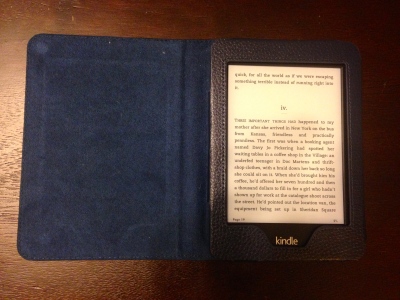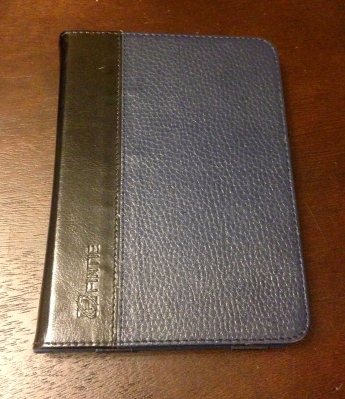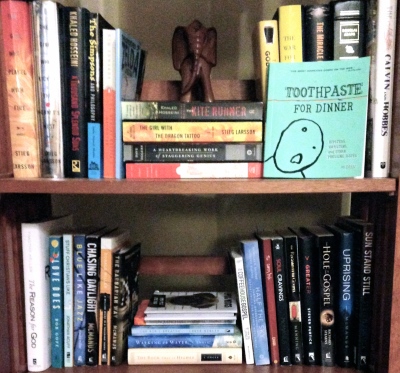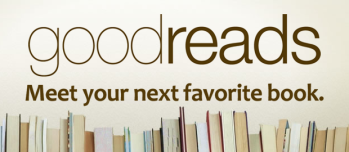Today's post is a little bit different than normal. I am always looking for new book and author recommendations. So I decided to start a list of book recommendations here on my blog.
Below are the most popular fiction genres and a few book recommendations in each category. I've read most of the books recommended, but those I haven't come highly recommended. I hope this section helps you find a new book to read outside your normal reading interests!
Also, please send me suggestions to add to the list. If there is a novel you absolutely love, tell me and I'll add it to the appropriate genre. Happy Reading!
Contemporary / Mainstream
Contemporary or mainstream novels are set in the present with realistic settings and characters. This is a broad category and often, contemporary or mainstream fiction novels fit into at least one other genre.
Recommendations:
The Lovely Bones by Alice Sebold The Girl with the Dragon Tattoo by Stieg Larsson
The Girl with the Dragon Tattoo by Stieg Larsson Fight Club: A Novel by Chuck Palahniuk
Fight Club: A Novel by Chuck Palahniuk My Sister's Keeper by Jodi Picoult
My Sister's Keeper by Jodi Picoult
Literary Fiction
Literary fiction is “serious” fiction and and holds literary merit. They are complex, multilayered novels which wrestle with universal issues. Literary fiction books stand the test of time and win awards for their depth and insight.
New & Old Literary Classics:
Pride and Prejudice by Jane Austen To Kill a Mockingbird by Harper Lee
To Kill a Mockingbird by Harper Lee The Great Gatsby by F. Scott Fitzgerald
The Great Gatsby by F. Scott Fitzgerald The Kite Runner by Khaled Hosseini
The Kite Runner by Khaled Hosseini
Historical Fiction
Like the name suggests, historical fiction are novels set in the past, usually during a significant historical time period. The novel may contain well known historical figures and/or fictional characters. Great historical fiction authors do diligent research to recreate the setting and characters accurately.
Recommendations:
The Light Between Oceans by ML Stedman
The Forgotten Garden by Kate Morton
The Grapes of Wrath by John Steinbeck
The Help by Kathryn Stockett
Thriller
Novels classified as thrillers are fast paced, intense, and filled with life threatening situations. Usually, the protagonist is in a race against time against powerful villains. Thrillers are filled with cliffhangers and suspense. Sometimes, there is an element mystery in thrillers, but in a thriller, the hero is focused on stopping the villains, not solving the mystery. Also, thrillers are based in action sequences and have larger stakes than mystery novels.
Popular Thriller Series & Authors:
The Girl with the Dragon Tattoo by Stieg Larsson
The Bourne Identity by Robert Ludlum
Gone Girl by Gillian Flynn
Mystery
Mystery novels are focused on solving a puzzle of some sorts, usually a crime. During the course of the novel, the protagonist investigates and searches for clues to find the “one who did it.”
Mystery Authors & Series:
Jo Nesbo’s Harry Hole Series - starts with The Redbreast
In the Woods by Tana French
Sherlock Holmes
Science Fiction
Science Fiction is a genre which incorporates current science and technology or future science and technology into the story. Science Fiction operates under the assumption that the science in the novel is based in reality or real science concepts. Often science fiction stretches want we know about science now to create a fictional world based in the future.
Book Recommendations:
Ender’s Game by Orson Scott Card
Fahrenheit 451 by Ray Bradbury
The HitchHiker’s Guide to the Galaxy by Douglas Adams
The Passage by Justin Cronin
Fantasy
Fantasy novels involve supernatural forces, magic, and mystical creatures with an imaginary setting. Common fantasy themes include quests for precious objects, rescuing damsels in distress, and battles between good and evil.
Book Recommendations:
The Night Circus by Erin Morgenstern
The Lord of the Rings by J.R.R. Tolkien
A Wrinkle in Time by Madeleine L'Engle
The Chronicles of Narnia by C.S. Lewis
Horror
The goal of a horror story is to frighten its readers. Horror novels will use blood and guts, violence, supernatural forces or even psychological suspense to accomplish this goal.
Books to Frighten:
The Shining by Stephen King (or many others by King)
Frankenstein by Mary Shelley
The Twelve by Justin Cronin
Romance
Romance novels revolve around the love story of two people in an exotic setting. Romance novels are dramatic, but always end happy. (The guy gets the girl).
Love Stories:
Anything by Nicholas Sparks
The Time Traveler’s Wife
Twilight
Chick Lit
Chick lit novels are fun, light-hearted books centered on the modern woman. Sometimes, chick lit includes romantic elements, or it may center on a woman’s relationship with her family, friends or her career. Chick lit novels are great beach reads.
Recommendations:
The Stephanie Plum series by Janet Evanovich
Confessions of a Shopaholic by Sophie Kinsella
Young Adult
Young adult is a genre written for a specific audience, those in adolescence, around the ages of 12-22. The protagonist is always an adolescent. Young adult books deal with themes associated with this age group such as growing up, life transitions, and love. Young adult books also fit into many of other genres. Some of the most popular series in the past decade are young adult books and many adult readers love the young adult genre.
This List could go on and on for me:
Harry Potter - My favorite is the 4th in the series.
The Hunger Games by Suzanne Collins
Pretty Little Liars by Sara Shepard
The Giver by Lois Lowry
The Fault in Our Stars by John Green
Graphic Novel
A graphic novel conveys a story to the reader using sequential art. Graphic Novels can be non-fiction, fictional or a series of short stories. I am not an expert in this genre, but here’s some recommendations from those more educated than me in this department.
Recommendations:
The Walking Dead: Compendium One Building Stories by Chris Ware
Building Stories by Chris Ware The Hive by Charles Burns
The Hive by Charles Burns Y: The Last Man, Vol. 1: Unmanned
Y: The Last Man, Vol. 1: Unmanned Blankets by Craig Thompson
Blankets by Craig Thompson
That's it! What did I miss? Let me know below!


 I have had my eye on the
I have had my eye on the 















 I've mentioned
I've mentioned 

